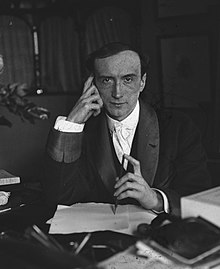Henry Bataille
Henry Bataille | |
|---|---|
 Henry Bataille 1911 | |
| Born | Félix-Henri Bataille 4 April 1872 |
| Died | 2 March 1922 (aged 49) |
| Known for | French dramatist, poet. |
Félix-Henri "Henry" Bataille (4 April 1872, in Nîmes – 2 March 1922, in Rueil-Malmaison[1]) was a French dramatist and poet. His works were popular between 1900 and the start of World War I.
Bataille's parents died when he was young.[2] He attended the École des Beaux-Arts and Académie Julian[3] to study painting, but started writing when he was 14. Henry wrote plays and poems, but after the success of his second play, La Lépreuse, he became a playwright exclusively. Bataille's early works explored the effects of passion on human motivation and how stifling the social conventions of the times could be. For example, Maman Colibri, is about a middle-aged woman's affair with a younger man. Later, Bataille would gravitate towards the theatre of ideas and social drama.
Bataille was also a theorist of subconscious motivation. While he did not use his theories in most of his own works, he influenced later playwrights such as Jean-Jacques Bernard and the "school of silence".
Works
[edit]- La Belle au bois dormant, 1894
- La Chambre blanche (poetry), 1895
- La Lépreuse, 1896
- L'Enchantement, 1900
- Le Masque, 1902
- Maman Colibri (Mother Colibri), 1904
- La Marche nupitale, 1905
- Poliche, 1906
- La Femme nue, 1908
- Le Scandale, 1909
- La Vierge folle (The Foolish Virgin), 1910
- L'Enfant de l'amour, 1911
- Le Phalène, 1913
- L'Amazone, 1916
- La divine tragédie (poetry), 1917
- L'Animateur, 1920
- L'Homme à la rose, 1920
- La Tendresse, 1921
- La Possession, 1921
- La Chair humaine (Human Flesh), 1922
Filmography
[edit]- The Naked Truth, directed by Carmine Gallone (Italy, 1914, based on the play La Femme nue)
- The Wedding March, directed by Carmine Gallone (Italy, 1915, based on the play La Marche nupitale)
- La falena, directed by Carmine Gallone (Italy, 1916, based on the play Le Phalène)
- L'Enfant de l'amour, directed by Emilio Ghione (Italy, 1916, based on the play L'Enfant de l'amour)
- Maman Colibri, directed by Alfredo De Antoni (Italy, 1918, based on the play Maman Colibri)
- Le Scandale, directed by Jacques de Baroncelli (France, 1918, based on the play Le Scandale)
- Incantesimo, directed by Ugo Gracci (Italy, 1919, based on the play L'Enchantement)
- La vergine folle, directed by Gennaro Righelli (Italy, 1920, based on the play La Vierge folle)
- La maschera, directed by Ivo Illuminati (Italy, 1921, based on the play Le Masque)
- The Nude Woman, directed by Roberto Roberti (Italy, 1922, based on the play La Femme nue)
- The Scandal, directed by Arthur Rooke (UK, 1923, based on the play Le Scandale)
- The Nude Woman, directed by Léonce Perret (France, 1926, based on the play La Femme nue)
- La Vierge folle, directed by Luitz-Morat (France, 1929, based on the play La Vierge folle)
- The Wedding March, directed by André Hugon (France, 1929, based on the play La Marche nupitale)
- La Possession, directed by Léonce Perret (France, 1929, based on the play La Possession)
- Der Narr seiner Liebe, directed by Olga Chekhova (Germany, 1929, based on the play Poliche)
- Maman Colibri, directed by Julien Duvivier (France, 1929, based on the play Maman Colibri)
- L'Enfant de l'amour, directed by Marcel L'Herbier (France, 1930, based on the play L'Enfant de l'amour)
- La Tendresse, directed by André Hugon (France, 1930, based on the play La Tendresse)
- Zärtlichkeit, directed by Richard Löwenbein (Germany, 1930, based on the play La Tendresse)
- The Nude Woman, directed by Jean-Paul Paulin (France, 1932, based on the play La Femme nue)
- Le Scandale, directed by Marcel L'Herbier (France, 1934, based on the play Le Scandale)
- Poliche, directed by Abel Gance (France, 1934, based on the play Poliche)
- The Private Life of Don Juan, directed by Alexander Korda (UK, 1934, based on the play L'Homme à la rose)
- La Marche nupitale, directed by Mario Bonnard (France, 1935, based on the play La Marche nupitale)
- The Wedding March, directed by Mario Bonnard (Italy, 1935, based on the play La Marche nupitale)
- Maman Colibri, directed by Jean Dréville (France, 1937, based on the play Maman Colibri)
- Second Youth, directed by Michał Waszyński (Poland, 1938, based on the play Maman Colibri)
- La Vierge folle, directed by Henri Diamant-Berger (France, 1938, based on the play La Vierge folle)
- Imprudencia, directed by Julián Soler (Mexico, 1944, based on the play Le Scandale)
- L'Enfant de l'amour, directed by Jean Stelli (France, 1944, based on the play L'Enfant de l'amour)
- La Femme nue, directed by André Berthomieu (France, 1949, based on the play La Femme nue)
Notes
[edit]- ^ "HENRY BATAILLE : French Dramatist Dead". The Sun. No. 3539. Sydney. 4 March 1922. p. 1. Retrieved 20 August 2017 – via National Library of Australia.
- ^ "Henry Bataille", Encyclopædia Britannica Online
- ^ (fr)La Rampe : revue des théâtres, music-halls, concerts, cinématographes, 1922
References
[edit]- "Bataille, (Félix) Henri". Retrieved 17 April 2009 from Funk & Wagnalls New World Encyclopedia database, EBSCOhost
- "Bataille, Félix Henry". Encyclopedia Americana. Grolier Online [1]
- Buss, Robin. "Baitaille, Henry". Grolier Multimedia Encyclopedia. 2009. Grolier Online [2]
- "Henry Bataille". In Encyclopædia Britannica. Retrieved 17 April 2009, from Encyclopædia Britannica Online [3]
External links
[edit] Media related to Henry Bataille at Wikimedia Commons
Media related to Henry Bataille at Wikimedia Commons
